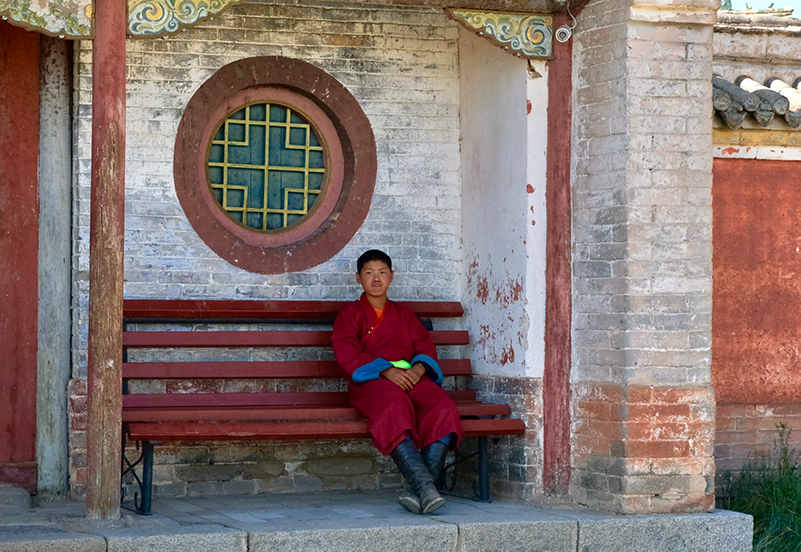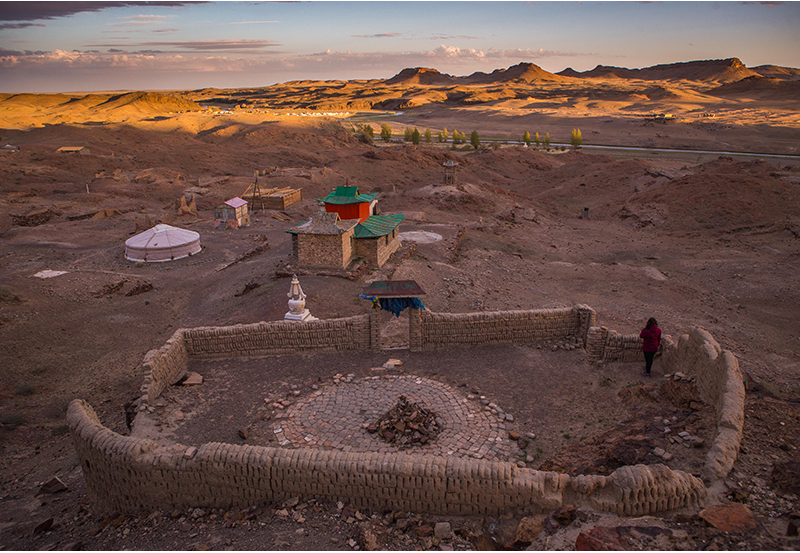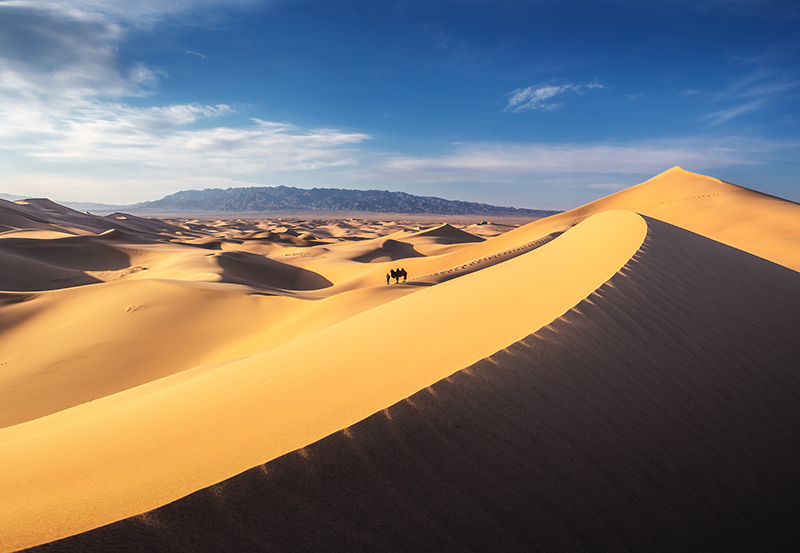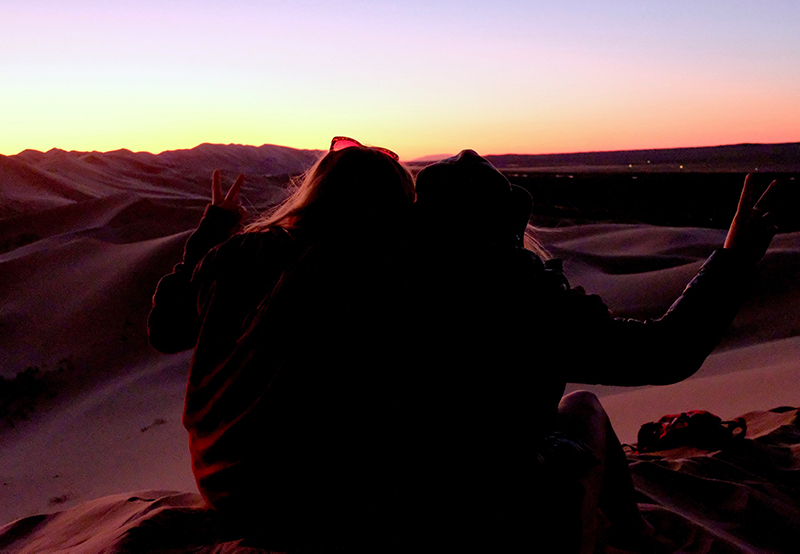From Rolling Grasslands to the Barren Gobi Desert
9 days
Overview
Discover the Wonders of Mongolia: A Journey Through Contrasts
Mongolia, a vast landlocked country, is a treasure trove of contrasts, with each corner offering its own unique experiences. Begin your adventure in the modern capital, Ulaanbaatar, and embark on a scenic drive across central Mongolia’s expansive steppe, where traditional round felt dwellings, known as gers, dot the landscape alongside large herds of grazing livestock.
Your journey will take you to the UNESCO-listed Orkhon Valley Cultural Landscape, named for its meandering river. This historic region served as the cradle for numerous ancient nomadic confederations, evidenced by ancient Turkic memorials, the ruins of a Uighur capital, and the remnants of the Mongol Empire's capital.
As you travel from the lush rolling grasslands to the stark beauty of the Gobi Desert in the south, marvel at the dramatic shifts in landscape. Witness how nomadic families have thrived in these contrasting environments, living much like their ancestors did centuries ago. Experience Mongolia’s rich cultural heritage and breathtaking natural beauty on this unforgettable journey.

Date & Price:
Departing: 10-06-2026
Finishing: 18-06-2026
Status: Open
Departing: 01-07-2026
Finishing: 09-07-2026
Status: Open
Departing: 15-07-2026
Finishing: 23-07-2026
Status: Open
Departing: 05-08-2026
Finishing: 13-08-2026
Status: Open
Departing: 02-09-2026
Finishing: 10-09-2026
Status: Open
Price Per Person:
Includes:
- 2 overnights at 4* hotel in UB (twin)
- 6 overnights at the Ger camp (twin/triple)
- All indicated meals ( B-Breakfast, L-Lunch, D-Dinner )
- Drinking water
- All visits, NP fee and sightseeing fees
- Comfortable 4x4 van including gasoline with experienced driver
- English speaking guide
- All airport transfers
Exludes:
- Travel insurance
- Optional activities (camel and horse riding...)
- Meals not indicated
- Drinks
- Gratuities
- Visa to Mongolia
- International flights &Travels
- Hotel early check-in and late check-out
- Other services not mentioned in the itinerary
Travel information:
- * Visit Mongolian ancient capital city Karakorum
- * Visit Ongi monastery, consists of ruins of two monastery complexes on either side of the Ongi River
- * Visit Bayanzag, nicknamed Flaming Cliffs by an American explorer named Roy Chapman Andrews
- * Visit the Khongor sand dunes overlooking the green meadow of the Khongor river
- * Visit Yolin Am, translated as Lammergeier’s valley, named after a large species of bird also known as the “bearded vulture”
- Visit to Tsagaan Suvarga, translated as the White Stupa in English is a vibrant clay formation slope with a brink that is about 400 meters long and 60 meters high.
Day 1 Arrive in Ulaanbaatar
Arrive in Ulaanbaatar, the bustling capital of Mongolia. Our representative will pick you up from the airport and transfer you to a centrally located hotel. After settling into your room, meet your guide in the lobby for a walking city tour to the main square and nearby museums. Then attend an evening show of traditional performances followed by a welcome dinner.
- D
- Hotel
Day 2 Drive to Kharkhorin town
Travel west to Kharkhorin, a recent town named after and located adjacent to where the ancient Mongol capital Kharakhorum once flourished. The second son of Chinggis Khan founded the capital in the early 13th century before it was destroyed by the Chinese Ming Dynasty in the late 14th century. Today, the main attraction here is the Erdene Zuu monastery center, established in 1585 as introduction of Tibetan Buddhism as Mongolia’s main religion by a Mongol Khan. This monastic center was constructed from ruins of the ancient Mongol capital. A section of the monastery complex is now a museum displaying Buddhist artworks while some of the other monastery buildings are active with monks doing their daily practices. There is also a visit to the local Kharakhorum museum.
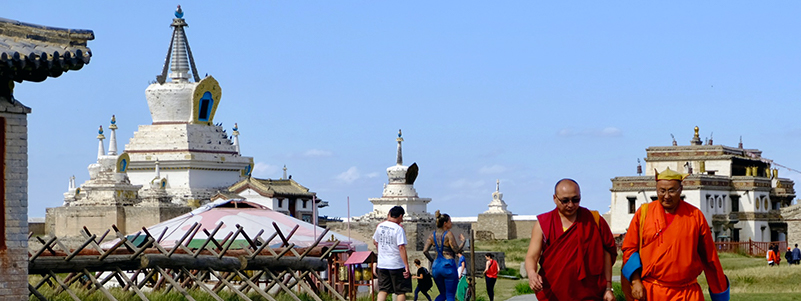
- B.L.D
- Ger camp
- 360 km
Day 3 Drive to Ongi monastery ruins in the semi-Gobi
The Ongi Monastery comprises of ruins of two monastery complexes on either side of the Ongi River. Ruins of the older Khutagt monastic center, founded in 1660, used to consist of various administrative buildings as well as 11 temples situated on the southern bank while ruins of the later 18th century Barlim complex consisted of 17 temples situated on the northern bank. During the communist anti-religion purges of the 1930s, both complexes were completely destroyed. Following the introduction of democracy, revival of Buddhism took place beginning in the 1990’s with reconstruction and re-opening of monastery centers in Mongolia. Ongi monastery followed along with commencement of a newly built temple in 2004.
- B.L.D
- Ger camp
- 320 km
Day 4 Flaming Cliffs
Drive to Bayanzag, nicknamed “Flaming Cliffs” by an American explorer named Roy Chapman Andrews who led an expedition team here in the 1920s. He was a proponent of “Out of Asia” theory of humankind’s origin. While searching for remains of earliest humans, which they did not find, the team instead discovered the first recorded fossilized nest of dinosaur eggs here at this site along with other dinosaur fossils.
- B.L.D
- Ger camp
- 180 km
Day 5 Drive to Singing Sands
Our next destination is the Khongor sand dunes overlooking the green meadow of the Khongor river. This long, narrow stretch of sand dunes continues for over 100 km with width of about few km to 12 km. From flatland to the highest ridge is around 200 meters. In the late afternoon, you can try to climb up to one of the crests or walk the lower slopes and enjoy the surrounding view. It’s also called the “Singing Sands” due to a distant propeller hum heard when strong winds push tons of sand grains down steep slopes thus causing friction and producing small tremors.
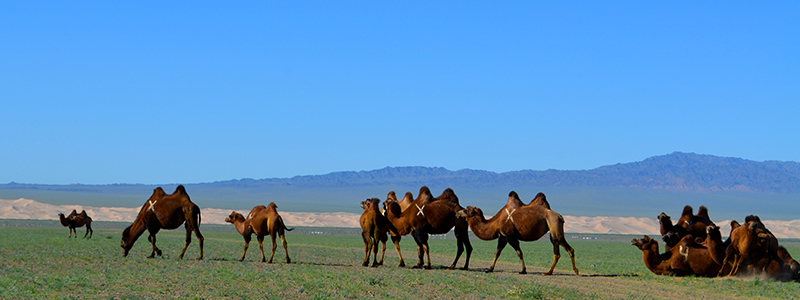
- B.L.D
- Ger camp
- 210 km
Day 6 Hiking in the Lammergeier’s valley
Drive to Yolin Am, translated as Lammergeier’s Valley, named after a large species of bird also known as the “bearded vulture” which glide over the gorge where they live and breed on crags of its high mountains. Lammergeiers mostly feed on bones. They can swallow whole or bite through brittle bones and its powerful digestive system quickly dissolves even large pieces. If a bone is too large to swallow, they carry it up and drop it down onto rocks below to smash it into smaller pieces. Nestled within the Three Beauties Mountain range, the narrowest part of its gorge shelters ice until July despite the hot desert temperature. The stream that flows through, the lush valley and its surrounding mountains altogether is an oasis in the middle of the desert accompanying diverse wildlife.
- B.L.D
- Ger camp
- 180 km
Day 7 Drive to the White Stupa cliffs
Drive to Tsagaan Suvarga, translated as the White Stupa, is a vibrant clay formation slope with a brink that is about 400 meters long and 60 meters high. This naturally occurring formation once was part of a seabed eons ago. Ores exposed to oxygen created the differing purple, orange, and reddish hues that make it stand out amongst its surrounding flat expanse.
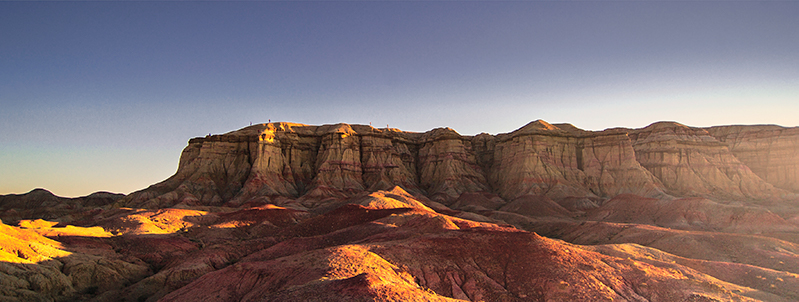
- B.L.D
- Ger camp
- 215 km
Day 8 Return to Ulaanbaatar
Drive back to Ulaanbaatar. Upon arrival, transfer to the hotel and rest or self-explore the city until farewell dinner.
- B.L.D
- Hotel
- 440 km
Day 9 Departure
Pick up from the hotel and transfer to the airport for your departure flight.
- B
Reviews

arantzazugraciag
An unforgettable trip in very good company! Lkhagva, our driver, knows each route perfectly, he is a very good driver and a very good man! His van is the best to get around Mongolia. And Odna was an exceptional guide, she speaks English perfectly and is so sweet and friendly :))
If you are hoping to take a trip to Mongolia, the Dashka agency is highly recommended. Very well organized and serious. It was a perfect 21 day trip!
We brought along very beautiful people, amazing landscapes and unforgettable experiences!
